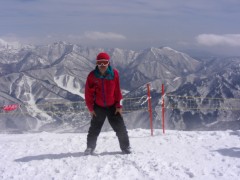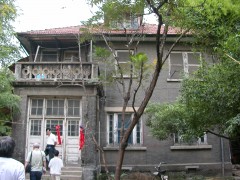14 March 2010
Film"The Last Emperor" Japan and China
I've seen this movie a few times in the past. But I watched it on TV last week during my ski trip to Naeba, Niigata Prefecture, Japan.
True story of the last emperor of Sino dynasty, Pu Yin, who was crowned at the age of 3. Since he became the emperor, he had been like imprisoned in the Forbidden City Palace until the revolution kicked him out from there. After that, he was used by Japanese imperial army to set up puppet state called Manchuria Empire. He was crowned as emperor again but again he could never actually rule the country, only used as puppet.
The film described how Japan exploited him for its greedy purpose. I know history about that. Pu Yin was accused of treason for his collaboration with Japanese but acquitted.
A few years ago, Japanese TV station produced a mini-series drama of Pu Yin's brother who joined the Japanese army and married Japanese peer's daughter. The story was from Japanese wife Soga Hiro's perspective. The brothers believed they could establish truely good state for Chinese but Japanese only used them to expand their territory and steel resources from Chinese.
Today not many Japanese know about this part of history, especially youngsters don't. Many Chinese visit Japan for tourism. Last week I saw many Chinese skiing in Naeba Ski Resort in Niigata. They seem to enjoy skiing and bathing in hot spring. Not just Naeba, I've seen Chinese skiers in other ski slopes such as Zao in Yamagata, and Shizukuishi in Iwate. These days skiing has become popular sport in China and skiing in Japanese ski slopes is greatest status for them.
I am so glad many Chinese come here and enjoyed although very sad things happened between the two nations.
I hope they enjoyed magnificient view of Naeba like this.
11 February 2009
Anxious to see the film "John Rabe"
In Berlin film festival, a very controversial film would be shown.
The title is "John Rabe." The story of German business man who saved tens of thousands of Chinese in Nanking when the city was invaded by Japanese imperial army. He and other westerners set up International Safety zone in the center of the city. He became the leader of the committee that managed the zone. He is like Oskar Schindler in China.
The movie is scheduled to be released in April in Germany and China. Release in Japan seemed not be determined.
I think it should be shown in Japan, too at least in mini-theatres or civil conventions like No More Nanjing people did last December.
Please see the article for that event.
In September 2004, I actually visited the house Rabe lived.
It may be very hard for Japanese to see the bad past.
Many right wingers denied the existence of the massacre. They say Rabe was liar.
John Rabe was kind of complicated figure of the history. He was loyal to Nazism. He used Nazi flag to avoid bombing from Japanese army. He reported Nazi officials the atrocities in Nanking. But he was detained and interrogated by that act because Germany at that time was allied with Japan. Actually Nazis has done more of Nanking things so called "Holocaust" afterwards.
The film would be very interesting in the sense a good man loyal to the evil organization has done good thing. The below is trailer of the film.
11:30 Posted in China, Deutschland, Film | Permalink | Comments (0) | Tags: war, history
31 January 2009
Holocaust and Rape of Nanking
According to Germany's prominent magazine, Spiegel, there has been a controversy over Roman Catholic Pope Benedict, who is German recovered ties with English bishop, Richard Williamson who is holocaust denier. Mr. Willamson claims there was no gas chambers, and the number of holocaust victims is 300,000 far lower than 6 million, which most historians suggest.
Pope Benedict seems to like stirring relations with other religions, a few years ago, he made some statement that insults Islamic prophet, Muhanmad. Does he represent German's still Nazi ideology?
Interestingly enough, such historical argument has been going on in Japan in regard to relationship with its neighbor, China.
China claimed that Japanese imperial army mass-murdered 300,000 innocent people in Nanking, 1937.
But Japanese right-wingers claim it was only 40,000 or less. Some extremists claims no such mass-murder occurred.
Recently Air Force chief in Japan was dismissed by the government over his publicly released essay which claimed Japan's invasion of China was legal. But he's been well-received by the public since then.
Germany and Japan were the losers of the Second World War. It is natural that such pheomenons occur.
People in both countries feel they have been forced to have negative point of views on their histories by victors of the war.
The title of the novel would be "Bauhausler". Hope you enjoy it. I am reading Ian Kershaw's book on Nazism for the research.
I think history should be viewed objectively. That's the very way of learning history.
Soon, I will start a novel which a story takes place in 1930's Germany. Japanese woman who travelled to Berlin to study Bauhaus art met a Jewish teacher and a Nazi-officer and then she got involved with the both men.
19:52 Posted in China, Deutschland, Japan News | Permalink | Comments (0) | Tags: history, holocaust, religion, nazis
20 December 2008
Film:"Nanking" Massacre committed by Japs
Last Sunday, I went to the public conference building in Tokyo. One room was rent by Japanese peace group named "No more Nanjing."
The purpose of the room renting was to show a very shocking Hollywood produced documentary film "Nanking" and hold the public hearing of the masscre survivor from Nanjing. Plus public speech by journalist of Japan's mainstream newspaper, The Asahi Shimbun.
The below is the preview of the film. The film was shown in the U.S. and China.
It was the first showing in Tokyo, Japan. Very first one in Japan was done in Fukuoka, Japan on 7 of December.
The film started with the speech of memoires of westerners who stayed in Nanjing during the occupation by the Japanese army.
The speeches are made by the actors who disguised as actual characters in that event.
In August 1937, Japanese army grounded on Shanghai and started invasion of China. They bombed Nanjing (Nanking) which was the capital of China at that time. In November the troops arrived in Nanjing and occupied the city. They looted, raped and killed Chinese citizens there.
The westerners set up the safety zone to protect Chinese. American college teacher, Minie Vautrin acted by Mariel Hemingway, Ernest Hemingway's grand daughter defended young women from rape by Japanese.
The actual footages, real talking of survivors and soldiers are also shown. The survivors talked about their rape experience or what happened in front of them such as their parents or brothers or sisters being murdered in front of them. The soldiers talked how and why they mass-murdered thousands of POW or innocent citizens and raped women.
There is not much new to me because I've got involved in this peace activity and learned the history of Sino-Japan war in 1930's.
It was cruel, our people in fact did terribles things to neighboring nations before WW2 ended.
The survivor who talked to the audience (approximately 200) in the conference room was the old Chinese woman who experience rape by Japanese soldier. She was raped and survived in the hell. But even after the war was over, she had to go through very hard time because her husband treated her so badly because she was found not virgin. She never could tell him why she was not. After the age of 80, she decided to speak up.
After her testimony, Japanese journalist, Mr. Yoichi Jomaru made a speech on the role of his company in the war. During the war time, especially embedded journalists were not allowed to report anything unfavourable to their troops, they had to act as PR section of the military. But the media themselves actively became backers of their troops. That exactly happens even in present time when freedom press is insured.
Some right wingers criticize me and other peace activists for revealing such unfavourable stories of Japan's history. I do not get along with them. I love my country. I am proud of being Japanese. That is why I am involved in this activity. By doing so, we can appeal to the world including Chinese people, we are no longer brutal like that in the film, we know the facts, so we do not do that again.
And we all wish for the world peace and happiness of all the people on the earth.
Response to Christopher's question:
Rape is crime in modern Japan and even before the war ended it was a crime in our terriorty or outside. What the troops did in China was against Geneve Convention and even the marshal law of the imperial army.
The comic you suggest is not popular in Japan but maybe among porno comic maniacs, not among ordinary comic fans.







